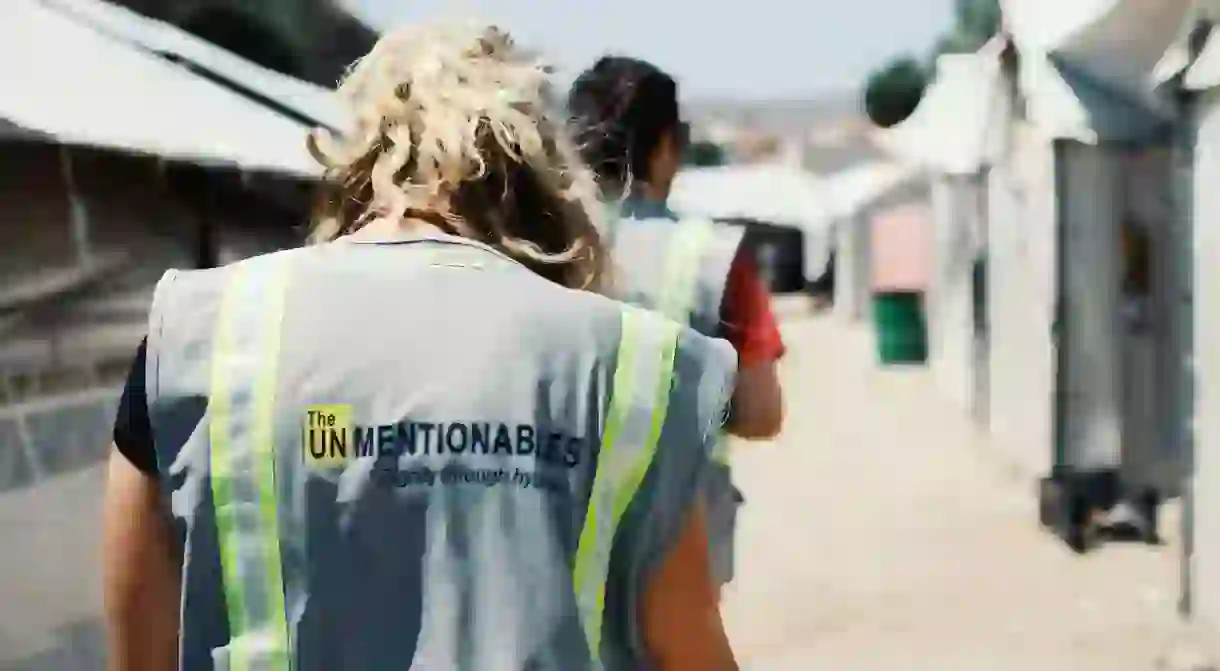Meet the Woman Bringing Dignity Through Hygiene to Refugees Around the World

While intimate health is not something that most people talk about openly, it’s what a Texas-based nonprofit, The Unmentionables, does! Through product distributions, sexual and reproductive health education, and empowerment and livelihood programs, this organization is dedicated to helping displaced people around the world. The Unmentionables cofounder and CEO, Kaleigh Heard, explains why this work is so important.
Where did the idea for The Unmentionables come from?
I became involved in this work through a research project I was conducting—looking at the social and political issues that have impacted young male migrants as they resort to survival sex, prostitution, and fall victim to human trafficking at an unbelievably high rate. The fact that these boys were at risk on so many levels and had little access to protection and assistance hit me in a way unlike anything else.
Around the same time, my friend Megan was volunteering around Athens at various community centers and camps for the forcibly displaced community. While there, she sent out a desperate plea to her friends and family—thousands of people were being subjected to the indignity of wearing ripped, stained, or previously worn and secondhand underwear—or no underwear at all. On top of that, we noticed women and girls were being provided too few menstrual hygiene products, culturally inappropriate products, or that they were being distributed in public environments, often by men.
It became clear that there was a crisis within a crisis. We had to do something, and that’s how The Unmentionables came to be.

Why is it important to give refugees access to intimate hygiene products?
Because it’s important for human beings to have safe and consistent access to these items both for their health and for their human dignity. These things are considered basics in our daily life because they are often the basics of feeling confident and dignified—the very embodiment of the right to human dignity.
Why is it essential to offer an education component along with products you distribute?
At the core of The Unmentionables’ strategy are empowerment and prevention. By emphasizing an education-centric approach, The Unmentionables is able to provide this vital information in a safe and consistent way to our beneficiaries, allowing them to feel empowered to make safe, healthy, and well-informed choices.

The Unmentionables’ sexual and reproductive health programs are taught by Community Educators. What does this mean and why is it important?
From the start of my career, both in the international security and humanitarian sectors, one thing has always rung true—there are no solutions to issues, no matter what the topic, unless the community itself is leading the shift. After a series of pilots, it became very clear that while our team was very skilled at teaching these topics, there were barriers we would never be able to surmount—trust and language abilities were huge issues when it came to sexual and reproductive health education. So, we prioritized training others in sexual and reproductive health. Our Community Educators are leaders in the migrant community and are put through an intensive six-week training program in our curriculum and sexual and reproductive health pedagogical techniques. After completing the training, they run The Unmentionables’ education programs in their own languages, for their own communities, becoming a trusted source of information for many while receiving a fair wage in return.
Intimate health isn’t the only focus of the organization though. Can you tell us a little bit about why empowerment programs like UnExposed are so important?
Our approach to everything we do is through an empowerment model. After working with the displaced community for several years, it became clear that their voices and perspectives were taken away in the narratives about them. Media outlets speak about “refugees” as a nameless mass, creating their own story about entire communities, rather than giving them space to share their own. Through our UnExposed program, we have taught youth from a plethora of backgrounds the theory and skills of professional photography, photojournalism, and storytelling so they can tell their own stories.

As a young, female CEO, what advice would you give to other women who are interested in founding their own business or nonprofit?
Take what you are passionate about in your personal life and make it a reality. I cannot tell you how many hours, days, and weeks I have put into seeing this organization become a reality and a major player in the aid community, but I can tell you that because I loved this work before it was work, it has never felt like a burden.
My second piece of advice is to believe in yourself and what you are creating. There were points in this process when I was told no, or that we were crazy, or that what we were doing wasn’t needed. In reality, the opposite was true, and that is why we’ve had the success we have.
The Unmentionables has achieved a lot in a short amount of time. What are you most proud of?
I am incredibly proud of the launch of our Education and Livelihood programs, which have been the driving force behind our growth and impact in the past 18 months. When you prioritize the value and potential that is in the displaced community and build it directly into your model, great things happen. These people are the core of our organization, and we are very grateful to have them as a part of our team.

How can people get involved with The Unmentionables?
There are many ways to get involved. Volunteer, apply for an internship with us, set up a fundraising page, or donate. If you don’t have time to volunteer, financial contributions are always appreciated, as they allow us to purchase hygiene items for the communities we serve locally, cutting logistics costs and supporting the local economy. Finally—share our work with your friends and family!













